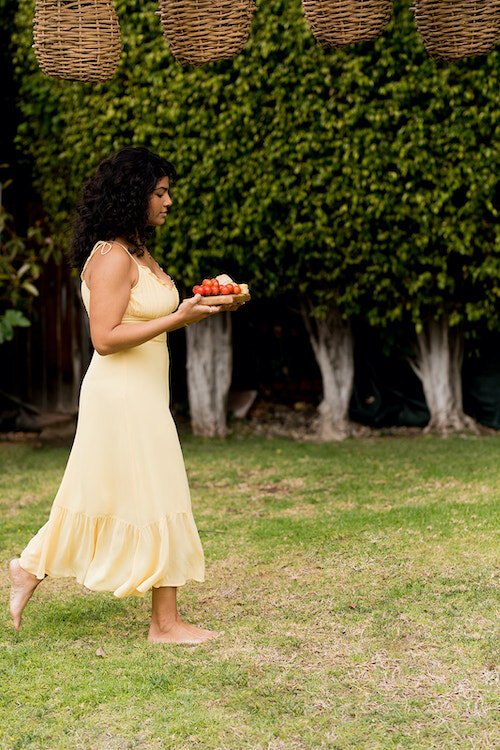
How To Throw Your First Dinner Party Post-Pandemic
*Shakily Sets Table*
I’ve hosted exactly two dinner parties in my adulthood: a potluck-style Friendsgiving in which a guest brought a massive spinach salad that no one ate and I cringed with fremdschämen, and another where I thankfully got to split all the cooking, table-setting, and drink-refilling duties with my partner.
My anxieties have remained the same as they were when I planned my childhood birthday parties. What if no one comes? Worse, what if only a few people come? *shudders* What if no one dances to (or, ahem, even mentions) my very carefully curated playlist? What if the conversation falls to an awkward lull? I’d rather not!
“Should hand sanitizer be provided or is it more of a BYO situation? Do we hug upon arrival?”
Add to these stressors the additional concerns that might arise after a global pandemic. Is it insensitive to enforce a dress code that forbids sweatpants? Should hand sanitizer be provided or is it more of a BYO situation? Do we hug upon arrival? Are we allowed to talk about anything other than the past year itself?
After spending over 12 months under imposed safety and social mandates, many of us are eager to reunite with our friends and family when it is safe to do so. And dinner parties—with their good eats, great drinks, and better company—are prime grounds for such. But how can we throw one comfortably? How can we calm our rightfully accrued anxiety?
If you’re looking to reunite with your loved ones at home, here’s how to handle hosting. (And if you’re not, we’ve got tips on that, too.)
Simplify The Menu
Pre-pandemic, upon receiving an invitation, my partner and I would pore over our bookmarked recipes and try our hands at short rib sliders and lamb meatballs. One Christmas, I made a sticky apple cake for the very first time, only to discover at the host’s house that its deliciously good looks couldn’t hide its dry texture.
Our dinner parties don’t have to be that way. Caterer and event designer Joseph Marini suggests a 2:1 rule.
“For every two items that are freshly prepared at home, add one store-bought item.”
“For every two items that are freshly prepared at home, add one store-bought item,” says Marini. “Just buy quality.” The same restraint applies to trying new recipes. “Don’t be too eager to experiment. Use the tried-and-trues you know you can cook well, and maybe add in one new dish.”
According to Marini, hors d’oeuvres can be simple too without sacrificing quality. “Stick with a few selections of really good cheese: a hard, semi-soft, and soft option”—with fine crackers, of course. And if you’re looking to get a bit fancier with finger foods, consider ones that can be made earlier in the day and served at room temperature, like prosciutto paired with melon or asparagus.
Keep the Conversation Optimistic
Here are the ways I try to avoid awkward silences in group conversation: I take a sip of whatever drink I have. If I don’t have a drink, I start talking about what I will drink. I go to the bathroom even if I don’t have to go to the bathroom. I also look around the room as if every object within it is suddenly fascinating. *sighs* There are better ways, folks.
One of which, according to etiquette consultant Julia Esteve Boyd, is to engage in mindful conversation topics (of which we have 99 suggestions, by the way). She proposes that we focus on the positive instead of the negative.
“Instead of reflecting on how difficult it was to stay home, look toward our future plans, like traveling. ”
“Now is not the time to compare notes,” says Boyd. “Everyone will have had different experiences during lockdown; some will have been a lot more harrowing than others.” Instead of reflecting on how difficult it was to stay home, Boyd suggests we look toward our future plans, like traveling.
We can also talk about any new hobbies or skills we learned during quarantine—like gardening, embroidery, or yoga—and, most importantly, about how they changed our perspectives. (If you need some help kicking off that convo, Marini offers that we look at our guests’ social media accounts before they arrive to find something they’ve posted.)
Despite this moment in time, you might want to refrain from discussing COVID-19 protocols, vaccination preferences, and politics for now. “Rather than inciting judgment about differing opinions,” Marini says, “it’s a time to feel grateful for what we are able to do. Celebrate the commonality of being able to be together.”
Ignore Instagram
Ah, Instagram. While the source of many joys, the social media platform—with its calculable followers and face-altering filters—can have other ill effects on its users, like a wavering self-esteem (me!) or nagging pressure to have the perfect home (my fellow editor!) No matter the reason, we can always choose to limit its influence over our party.
“We shouldn’t host to impress our community; we should host to reconnect with them.”
We shouldn’t host to impress our community; we should host to reconnect with them. So nix that overly complicated charcuterie board. (“They’re expensive to craft, most of it will go to waste and, while it looks good in a picture, it’s confusing and fussy,” says Marini. Plus, most people are afraid they’ll ‘ruin it.’” 🙃)
Not only are the optics not important, they might also be insensitive. Some of our followers might still be on lockdown or suffering from the pandemic elsewhere, so consider photo opportunities thoughtfully. Or, take one photo that everyone can share, and then ask for phones to be put away.
Boyd puts it simply and sweetly: “Focus on who you are with rather than who is watching.”
Address Our Anxiety
Finally, excitement and anxiety are not mutually exclusive. While we may be eager to see our loved ones, we might also still feel apprehensive. In those instances, we can create our own framework for comfort by limiting the number of invitations extended, asking guests to sanitize their hands upon arrival, and planning how we’ll greet them. (Not everyone may be ready to hug.) Thinking about these things beforehand might help reduce our anxiety levels.
And if, despite these tips, we’re all still feeling more uneasy than assured, we can listen to that instinct too. You do not have to host a dinner party this month, or even next. Re-emerging is not a race. While boundaries may have been set for us months ago, continuing to maintain them is now a personal choice. As Boyd notes, after a year of waiting, what’s a few more weeks?
“It’s better to feel fully prepared and in control,” says Boyd. “There may a certain level of apprehension and, as a host, you must decide what your coping level is.”
“You do not have to host a dinner party this month, or even next. Re-emerging is not a race.”
It’s been a challenging year to say the least, and community can often be central to healing. Gather in a way that makes you, and your guests, comfortable. And remember to focus less on perception and more on connection. “Everything doesn’t have to be perfect,” says Marini. “It should just be thoughtful.”
RELATED READING
Danielle Cheesman was born and raised in New Jersey, where she lived until moving to Philadelphia to study journalism at Temple University. She has spent her years writing and developing editorial visions for music, art, and lifestyle brands. Now residing in Los Angeles, you can usually find her taking pictures, making playlists, or cuddling her pup. Say hi on Instagram!
